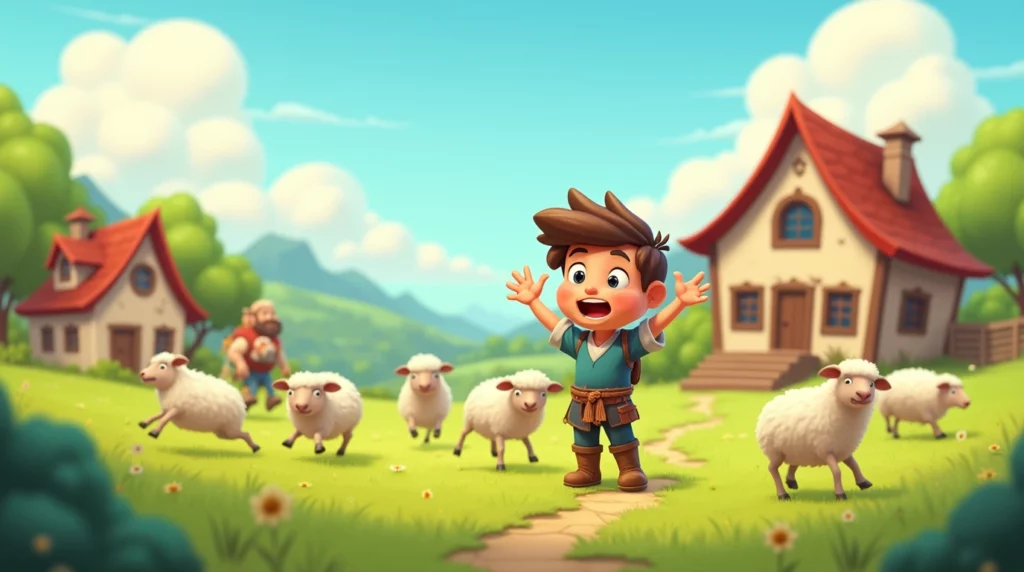6 Inspiring Short Stories for Kids That Teach Honesty and Integrity
فهرس المقالة
Introduction
In today’s world, honesty and integrity can feel like hidden treasures, and perhaps that’s why they’re so powerful when we find them. Children, as they grow and learn about the world, are constantly shaping their own understanding of right and wrong. Teaching values like honesty and integrity helps them build strong relationships, make ethical decisions, and develop a character that will guide them throughout life.
This article brings together six inspiring short stories for children with a moral about honesty and integrity. Each story presents a unique scenario where the values of truthfulness and character are tested. As you read, think about how these lessons might resonate with children in your life or spark a conversation around why honesty and integrity matter so much in friendships and beyond.
Story 1: The Honest Woodcutter

Once upon a time, there was a humble woodcutter named Ravi who lived in a small village. Every day, Ravi went to the forest to chop wood, which he sold to support his family. One day, while working near a river, his axe slipped out of his hand and fell into the water. Devastated, Ravi sat by the river, not knowing how he would provide for his family without his tool.
Seeing his despair, a wise old spirit appeared from the water, holding a golden axe and a silver axe. “Is this your axe?” the spirit asked, showing him the golden one.
Ravi shook his head. “No, that’s not my axe.”
The spirit then showed him the silver axe, and again Ravi replied, “No, that one isn’t mine either.”
Finally, the spirit held up Ravi’s old, iron axe. Ravi’s face brightened, and he exclaimed, “Yes, that’s my axe!”
Impressed by Ravi’s honesty, the spirit rewarded him with all three axes. From that day on, Ravi’s honesty became known throughout the village, and he prospered, not just in wealth but in friendships and respect.
Moral:
- Honesty brings rewards, often in unexpected ways.
- Integrity is more valuable than material wealth.
- Staying true to yourself builds trust and respect.
Story 2: The Lost Coin

In a busy town market, a young girl named Lily was exploring stalls when she noticed a shiny coin on the ground. She picked it up, realizing it was quite valuable, and looked around to see if anyone had dropped it. Lily’s family didn’t have much money, and she thought about how much the coin could help.
Just then, she spotted the market stall owner frantically searching the ground near his cash register. Lily walked over and tapped him on the shoulder. “Excuse me, sir, did you drop this coin?”
The shopkeeper’s face softened with relief, and he thanked her profusely. Moved by her honesty, he gave her a small reward and told her that such honesty was rare and precious. Lily learned that day that doing the right thing, even when it’s difficult, brings a sense of peace and often blessings.
Moral:
- Integrity means doing the right thing, even when it’s hard.
- Returning what doesn’t belong to you shows respect and consideration.
- Honesty can lead to unexpected blessings.
Story 3: The Boy Who Cried Wolf

In a small village, a young shepherd named Leo had the job of watching the sheep. He often found his task boring and decided to play a prank on the villagers. “Wolf! Wolf!” he shouted, pretending that a wolf was attacking his flock.
The villagers ran to help, only to find Leo laughing at his successful prank. This happened again and again, until one day, a real wolf appeared. Leo screamed for help, but this time, the villagers didn’t come. They assumed it was another trick.
In the end, Leo learned a harsh lesson about honesty. Lying had cost him the trust of his friends and neighbors, and that trust wasn’t easily restored.
Moral:
- Trust is fragile and easily broken by dishonesty.
- Lies may have unintended and serious consequences.
- People value and respect those who are truthful.
Story 4: Sarah’s Test of Integrity

Sarah was an excellent student, but one day during a difficult math test, she was tempted to peek at her classmate’s answers. The urge to cheat was strong; after all, she thought, “Just this once.” But as she sat there, she remembered something her parents often said: “Integrity is what you do when no one is watching.”
Sarah took a deep breath, closed her eyes, and decided to rely on her own knowledge. She struggled through the test but left with her self-respect intact. When she received her score, it wasn’t perfect, but she knew it was genuinely hers.
Moral:
- Integrity means making the right choice, even when it’s difficult.
- Self-respect is more valuable than cheating for a temporary gain.
- True success comes from honesty and personal growth.
Story 5: The Honest Messenger

Tom was chosen to carry an important message to the mayor of the neighboring town. His father had entrusted him with this task because he was dependable. Along the way, Tom’s friends invited him to play, tempting him to forget about his mission. For a moment, he wavered, but then he remembered the importance of his promise.
He kindly told his friends that he would play with them after he delivered the message. Though they were disappointed, they admired his determination. When Tom returned, his friends respected him even more, understanding that true friendship meant supporting each other’s responsibilities and promises.
Moral:
- Honesty and integrity strengthen friendships and build trust.
- Keeping promises makes others see you as reliable and trustworthy.
- Integrity is standing by your word, even when it’s challenging.
Story 6: The Golden Egg

A farmer owned a magical hen that laid a golden egg every day. Over time, however, the farmer became greedy and impatient. “Why wait for one egg a day?” he thought. “I’ll get all the gold at once.” So, he killed the hen, hoping to find a treasure inside, but there was nothing.
His greed had destroyed his good fortune. This story reminds us that honesty, patience, and integrity create lasting happiness, while greed and impatience often lead to loss.
Moral:
- Greed can destroy happiness and bring disappointment.
- Integrity, honesty, and patience yield lasting rewards.
- Taking shortcuts for quick gains often leads to regret.
Conclusion
Honesty and integrity are two of the most valuable lessons a person can learn. Each of these stories provides a different perspective on why these values matter. Children can learn that integrity isn’t about grand gestures but about small, everyday choices—returning what doesn’t belong to them, telling the truth, keeping promises, and resisting temptations to take shortcuts. Through honesty and integrity, children build trust, respect, and lasting friendships.
Encourage the children in your life to talk about these stories, ask questions, and think about how honesty can shape their friendships and choices. You’ll be helping them build a foundation for a life filled with trust, kindness, and respect.
FAQ Section
1. Why is honesty important for children?
Honesty helps children understand the importance of trust, which is essential for forming strong relationships. It also teaches them to make ethical choices that benefit both themselves and others.
2. How can I encourage integrity in my child?
Encourage integrity by modeling honest behavior, discussing the importance of truthfulness, and acknowledging when they make honest choices. Reinforcing these values at home helps them internalize them.
3. What age group benefits most from these stories?
These stories are ideal for children aged 5-12, as they provide relatable scenarios and accessible morals. The lessons are presented in a way that is easy for children to understand and apply.
4. Can these stories be used in classrooms?
Yes, these stories make excellent teaching tools in classrooms. They can be used to prompt discussions on character education and to teach children the importance of honesty and integrity in a relatable way.
If you found these stories helpful and meaningful, share this article with friends and family, or read these tales together with your children. Teaching honesty and integrity early on helps create a world filled with trust and kindness—qualities every child deserves to grow up with.






